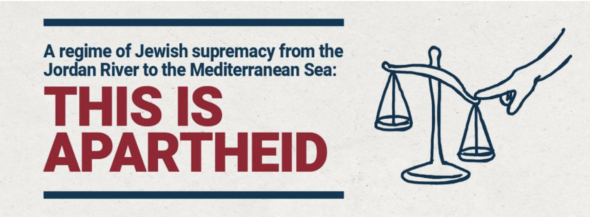- 527
- 537SHARES
On Tuesday morning, an EU-funded NGO, B’Tselem, published a report titled, “A regime of Jewish supremacy from the Jordan River to the Mediterranean Sea: This is apartheid.” (“Leading human rights group calls Israel an ‘apartheid’ state,” by Joseph Krauss, January 12, 2021.)
The invocation by B’Tselem of the term “supremacy” seems designed to latch on to trends in American politics. In fact, however, the language of “Jewish supremacy” recalls the title of David Duke’s 2002 book “Jewish Supremacism: My Awakening on the Jewish Question.” Although the phrase “Jewish supremacy” should have raised red flags everywhere, many mainstream news organizations published articles amplifying the group’s claims. Among those was the Associated Press – though the newswire did at least seem to know better than to repeat the phrase itself.

Instead of questioning why a group would employ such terminology, the AP reporter refers to B’Tselem as “a respected Israeli organization.” But, as CAMERA has pointed out before, in 2011, a B’Tselem photographer staged a scene that was passed on to an Israeli journalist falsely as a portrayal of Israeli soldiers treating a Palestinian child harshly. And in 2014, B’Tselem was forced to admit – after initial denials – that it was employing a Holocaust denier. Is this what the AP thinks of as “respected”?
Referring to B’Tselem simply as “Israeli” also conceals important information. NGO Monitor reports that, “based on financial information submitted to the Israeli Registrar of Non-Profits, in accordance with the Israeli NGO Transparency Law, B’Tselem received NIS 46,258,659 [about $14.6M] from foreign [i.e., non-Israeli] governmental bodies in 2012-2020.” NGO Monitor further reveals that between 2012 and 2016, such foreign donations comprised almost two thirds of B’Tselem’s budget. While the group operates in Israel and employs Israelis, it could not operate as it does without support from outside the country.
The B’Tselem report refers to “Palestinian citizens” of Israel and AP willingly repeats this misnomer, without quotes. But a 2020 survey shows that only seven percent of Israel’s non-Jewish population define themselves as “Palestinian.” In contrast, 51 percent identify as “Israeli-Arab.” B’Tselem’s language choice, parroted by AP, seems designed to blur the distinction between Palestinian nationality and Arab ethnicity. For years, Palestinians have asserted their own nationality, claiming (albeit disingenuously) to seek a “state” of Palestine. Referring to Israeli-Arabs as “Palestinian citizens” of Israel seems aimed at blurring distinctions to suggest “Palestinians”are just another ethnic minority within Israel, and thus to further the bogus “apartheid” analogy.
As legal expert Eugene Kontorovich has pointed out, “Invoking the heinous crime of Apartheid to criticize Israeli policy is a classic anti-Semitic rhetoric: it accuses Jews, uniquely among the peoples of the world, of one of the most heinous crimes, while also judging the Jewish state by a metric not applied to any other country. And the clear agenda is to entirely delegitimize Israel: the remedy for apartheid is not reform, it is the abolition of the regime itself and a total reshaping of the government.”
While AP does include some criticisms of the B’Tselem report, including a response from Professor Kontorovich, those criticisms come towards the end of its lengthy article, where many readers may never see it. This is in contrast to the prominent mention of Peter Beinart’s unrelated writings over the summer discussing his conversion to antizionism, as well as the agreement the B’Tselem report received from Nabil Shaath, a senior adviser to Palestinian President Mahmoud Abbas.
The AP notes that “Israel seized east Jerusalem, the West Bank and the Gaza Strip in the 1967 war — lands that are home to nearly 5 million Palestinians and which the Palestinians want for a future state,” but fails to inform readers that the 1967 war was a defensive one from Israel’s perspective, and that statehood has been offered to, and rejected by, the Palestinian leadership multiple times. AP also incorrectly claims that “There have been no substantive peace talks in more than a decade,” omitting the failed US-led 2014 talks. AP also fails to inform its readers that, contrary to the assertion by B’Tselem’s director that the newswire quoted, Israel’s Basic Law grants its Arab citizens equal rights under law.
